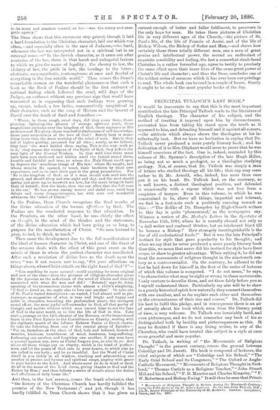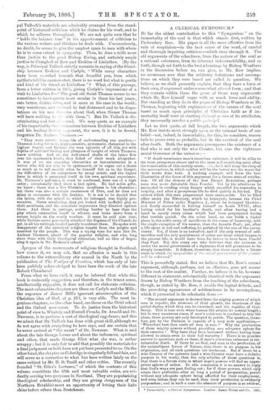PRINCIPAL TULLOCH'S LAST BOOK.*
IT would be inaccurate to say that this is the most important contribution the late Principal Tulloch made to the liteinture of English theology. The character of his subject, and the method of treating it imposed upon him by circumstances, prevented him from taking his stand upon the truth as it appeared to him, and defending himself and it against all corners, —the attitude which always shows the theologian at his in- tellectually best. But we have no hesitation in saying that Dr. Tulloch never produced a more purely literary book ; and his dedication of it to Mrs. Oliphant would seem to prove that he was himself conscious of the fact. One is, indeed, reminded by this volume of Mr. Spencer's description of the late Hugh Miller, as being not so much a geologist, as a theologian studying geology. Not, of course, that Dr. Tulloch was simply a man of letters who studied theology all his life ; that cap may seem rather to fit Mr. Arnold, who, indeed, has more than once put it on his head. Dr. Tulloch had, on the contrary, as is well known, a distinct theological position, and defended it occasionally with a vigour which was not free from a suspicion of temper. Even in this volume, in which he was constrained to be, above all things, impartial and tolerant, we find in a foot-note such a positively amusing remark as this : —"The dislike of Dr. Hampden by High-Church writers to this day is quite phenomenal,' as the newspapers say. Witness a review of Dr. Mozley's Letters in the Spectator of November 15th, 1884, where he is roundly abused not only as
a dull writer and confused thinker, but an intolerant bigot till
he became a Bishop How strangely inextinguishable is the fire of old ecclesiastical feuds !" But it was the late Principal's instinct for style that gave popularity to his thought; and when we say that he never produced a more purely literary book than this, we mean that never did his instinct for style have freer scope, or show to greater advantage. When writing it, he did not treat the movements of religious thought in the nineteenth cen- tury as a controversialist. On the contrary, he adhered to the line he laid down for himself in the first of the series of lectures of which this volume is composed. "I do not mean," he says, "to characterise what may be right or wrong in these movements. I only venture to describe them, and set them fairly before you as I myself understand them. Particularly my aim will be to show in a purely historical spirit how naturally they connect themselves with one another, and so far explain each other and themselves in the circumstances of their rise and course." Dr. Tulloch did his best to fulfil this pledge, and in consequence there is an air of serenity about his book which, even from the literary point of view, is very welcome. Dr. Tulloch was invariably lucid, and even picturesque, and we do not remember any book of his so distinguished both by lucidity and picturesqueness as this. It may be doubted if there is any living writer, in any of the Churches, who could have treated this subject in a style at once more graceful and more popular.
Dr. Tulloch, in writing of "the Movements of Religions Thought" in the present century, covers the ground between Coleridge and Dr. Jowett. His book is composed of lectures, the chief subjects of which are "Coleridge and his School," "The Early Oriel School and its Congeners," "The Oxford or Anglo- Catholic Movement," "Movements of Religious Thought in Scot- land," "Thomas Carlyle as a Religious Teacher," "John Stuart Mill and his School," "F. D. Maurice and Charles Kingsley," "F. W. Robertson and Bishop Ewing." It will thus be seen that Princi-
• M000mrnta of Religious Thought in Britain during the Nineteenth Century ; being the lt,fth Series of the St. Gilts's Lecture& By the late John Ttallech, D.D. LL.D., Senior Principal of the University of St. Andrews. London ; Longmans, Green, and Co. 1885.
pal Tulloch's materials are admirably arranged from the stand- point of historical criticism which he claims for his work, and to which he adheres throughout. We are not quite sure that he "holds the balance true" in his apportionment of criticism to the various writers and thinkers he deals with. Unconsciously, no doubt, he seems to give the amplest space to men with whom he is to some extent in sympathy. Thus, he does a trifle more than justice to the good Bishop Ewing, and certainly ample justice to Campbell of Row and Erskine of Linlathen. (By the way, is Principal Tulloch strictly accurate in saving of the friend- ship between Erskine and Carlyle, "While many characters have been scorched beneath that dreadful pen, from which epithets fell like cannon-shot, there is no word but what is gentle and kind of his friend at Linlathen"? What of this passage, from a letter written in 1865, giving Carlyle's impressions of a visit to Linlathen P--" The good old Saint Thomas seems to me sometimes to have grown more secular in these his last years ; eats better, drinks ditto, and is more at his ease in the world ; very wearisome, and inclined to feel distressed and to be dispu- tatious on his new theories about God, when Sinner Thomas will have nothing to do with them.") But Dr. Tulloch is dis-
criminating and fair all round. We may quote as an example of his impartiality this comparison between Erskine of Linlathen and his leading Sew eh opponent, the now, it is to be feared, forgotten Dr. Andre:, Thomson :— "They were utterly incapable of understanding one another,— Thomson being forem-ie, argumentative, systematic, rhetorical in the highest degree, and Erskine the very opposite of all this, yet with depths of spiritual feeling and glimpses of insight of which Thomson knew nothing. And so the well-aimed shafts of the latter flew over his opponent's head ; they failed of their mark altogether. It was of no use exposing obscurities or inconsistencies in a writer who did not aim to be systematic, or to argue out a thesis so much as to tell merely what he himself felt as to the Gospel, the difficulties of its acceptance by many minds, and the higher form in which it presented itself to his own spiritual experience. Dr. Thomson's polemics, it must be confessed, were not of a high order ; occasionally they show a bad spirit. He had noble gifts, we know ; there was a fine Christian manliness in his character ; but there was also a certain coarseness of fibre, and he does not shine in encounter with Mr. Erskine. It is not to be denied that the latter, with the school to which be belonged, was highly pro- vocative. Never retaliating, they yet looked with ineffable pity on their assailants, and the countless arguments they directed against them. And there is, perhaps, nothing harder to bear than the pity which entrenches itself in silence, and looks down from a serene height on the wordy warfare. It must be said also that, while Erskine never personally attacked the dogmas of the Church, he yet, in all his writings, tended quietly to subvert them. He spoke with disapproval of the prevalent religion taught from the pulpits and received by the people. This was a trying tone for men like Dr. Andrew Thomson, proud of the popular religion, and who, long since done with their theological education, had no idea of begin- ning it again in Mr. Erskine's school."
Apropos of the movements of religious thought in Scotland, how comes it, we may ask, that no allusion is made in this volume to the extraordinary stir caused in the North by the publication of The Vestiges of Creation, which has only of late been publicly acknowledged to have been the work of the late Robert Chambers From what we have said, it may be inferred that while this book is eminently suggestive, and therefore, in the truest sense, intellectually enjoyable, it does not call for elaborate criticism. The most exhaustive chapters are those on Carlyle and the Mills ; the exposure of James Mill's ignorant misconception of the Christian idea of God, at p. 213, is very able. The most in- genious chapters, on the other hand, are those on the Oriel school and the Oxford movement. To do justice from the historical point of view to Whately and Harrell Fronde, Dr. Arnold and Dr. Newman, is to perform a sort of theological egg-dance; and this we admit that Dr. Tulloch has done with great skill, although we do not agree with everything he here says, and are certain that he never arrived at "the secret" of Dr. Newman. What is said about the late George Lewes and about the influences, spiritual and other, that made George Eliot what she was, is rather scrappy ; but it is only fair to add that possibly the materials for a final judgment on both have not yet been presented to us. On the other hand, the chapter on Coleridge is singularly full and fair, and will serve as a corrective to what has been written lately on the same subject by Mr. H. D. Train and other critics. The recently founded "St. Giles's Lectures," of which the contents of this volume constitute the fifth and most valuable series, are evi- dently serving two purposes in Scotland. They are popularising theological scholarship, and they are giving clergymen of the Northern Establishment an opportunity of letting their light shine before others than Scotchmen.



































 Previous page
Previous page